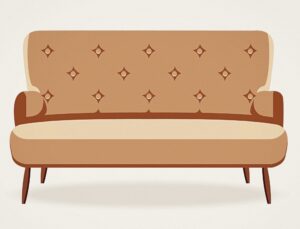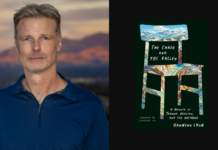Reflecting on my most dimly lit days, I see a flurry of white coats, grey scrubs, stethoscopes, brown leather couches, and sullen, exhausted expressions of generously paid psychiatrists noting my posture, my hygiene, my smile, my hair (Disheveled? Blame it on the curls), my clothes, my affect, and the words dribbling loosely from my mouth. All of them, the doctors in the ER department, the therapists I spill bitter truths to, the psychiatrists who click their pens and scribble illegible names on a blue prescription pad, don’t really hear me. They listen dutifully and make connections to terms they memorized in school, the ones listed in the DSM-V. Once the connections are made, inquiry stops. This takes ten minutes. I sit in a barren room with my hands neatly on my lap, stare at a white wall. I’ve spoken so many words, my mind feels empty. My spirit is drained. A doctor assures me I’ll “be okay.” I don’t know what that means.
Within my heart, something feels like it’s been stolen. Within my spirit something feels agonized. But they tell me it’s all in my brain, a tripped-up neurocircuitry, a misguided chemical. They can’t explain it, but they know they’re right. I stop speaking because they don’t listen to words.

I recall being a young girl, gardening tomatoes and carrots and beans with my dad, a tough on the outside, sensitive on the inside kind of guy. He’s been through more than I can understand. He drinks, I know, but I don’t yet process how much is too much. I can’t sleep at night because of the fighting. I fear for the safety of myself and my mom, so I get between them. I feel an anger I can’t fathom and punch things, kick things, throw things, cut and burn myself. Then we are homeless, and I sit on a bench contemplating the best way to end my existence. I am 11.
There is a moment I am sitting back among the vegetables, watching bees, ladybugs, earthworms. I dig my hands into Mother Earth and feel I’ve been here for centuries. I maintain a connection to something greater than myself, but words can’t explain it. There are too many other things in life I can’t explain and so I refuse these feelings.
I spend years afraid to talk, afraid of my home, afraid of my friends, teachers, strangers, pain, anxiety, the dark.
I am biracial white and black. I don’t realize it until high school. I don’t see myself in anyone. My Hispanic friends laugh at a joke in Spanish I can’t understand, and their English translation isn’t as funny. My white classmates talk about trips to Greece and Italy. I realize I am truly alone.
I find a therapist. She is white. We talk.
My next therapist is white.
My third therapist is white.
My fourth therapist is white. And so on.
I speak “properly” so as to relate to them. They do nothing to relate to me. I am alone.
No one speaks of their connection with the Earth. I hear nothing about nurturing the spirit, healing the generations, or embracing the culture. In college, I read papers about neurochemicals and the dopamine hypothesis. On my own time, I read Brain Disabling Treatments in Psychiatry by Dr. Peter R. Breggin, articles about pharmaceutical kickbacks, publication bias in the medical field, and poorly executed research that convinces the medical community I have a brain disease. I try Seroquel, Lexapro, Effexor, Abilify, Gabapentin, Lamictal, Cymbalta, Zoloft, Vraylar, Buspar, Hydroxyzine, Valium, Ativan, and Klonopin because I have a brain disease.
Through all this assimilation, part of me knows I’m not ill. I don’t relate to the term “mental illness.” My spirit rejects it and does so vehemently. I spend years ignoring that, submitting to treatment because my spirit isn’t a neurochemical.
I meet a community of people at Second Story Peer Respite where I find myself quite suddenly, and shockingly, employed. I am 20.
I engage in Intentional Peer Support. I learn to speak with compassion for others and myself, a skill I lack severely. I feel heard, seen, felt, and I talk, sometimes too much, less afraid. Community reminds me I am worthy, I am resilient, I am… still missing something.
The first person close to me to die, dies. I am excruciatingly existential. Meaninglessness wakes me from already disrupted sleep. Voices talk over each other and disallow me the freedom to eat (it’s contaminated) and to walk and to drive; I can’t get a block down the street without them telling me I’m going to crash, my car will blow up, I’m going to get trapped in the dark. Panic attacks push me to the side of the road. I stop eating, lose 20 pounds. There is the hospital yet again, their white walls and barred windows and cot-like bed with the creaky, wooden frame. I eat what the voices have designated as safe foods (carrots, broccoli, and the apple juice carton, strictly) and refuse to walk during exercise group in fear of my heart exploding.
I recover, like I always do. I realize there is not a moment in my history where I haven’t recovered. I ditch the medication, as I always do.
I am 27, working in the capacity of a social worker without the master’s degree and therefore without the pay—but they hire me because there’s something about me they like. They can’t explain it. I accept because I need a position that lessens the blow of the California economic and financial burden. I am agitated by certain clinical jargon but see the attempts at change in individual colleagues. I am hopeful, but not yet convinced.
One morning I wake to bone-shattering anxiety. I shove my way into my empty, shared office and log in to “La Cultura Cura,” a speaking event by a man called Jerry Tello. He speaks of inequity with emphasis on the healthcare systems, and the logical processes by which psychologists and other mental health professionals swear (CBT, DBT, TIC, etc). What does logic do for us, he asks, if we cannot connect with their spirit? He shares countless stories of childhood, of navigating racism, of learning the meaning of welcoming, of what he discovered the system lacks while pursuing a professional career. He highlights the importance of recognizing people’s stories as valid education, from our elders to the people we provide services to. I hear an echo of peer support practices, and yet it goes much deeper than that.
True healing, he says, begins and ends with the emotional, the spiritual, not with over-medicating and labeling our children or fostering this idea that all struggle equates to brain dysfunction. And while I have known from a scientific standpoint that the chemical imbalance hypothesis has not nearly enough concrete evidence, it’s not until I hear Tello speak to me in a way I understand that the depths of our reality in this system sinks in.
I think back to the therapists who asked me, “Any religious or spiritual values I should know about?” and I recall my head shaking no. Because they won’t understand. Even if they’re conscious of my reality, their inability to receive and feel my words disconnects us.
We as a system, as I’ve experienced it, are focused on control, on assimilation, on what might make us feel better as providers. We wish to stifle our fear (which is truly just misunderstanding), so we create “safety plans” and “treatment goals” and we tell ourselves this is what’s good for the other person. We disguise treatment as “their choice” by threatening them with hospitalization or treatment facilities if our plans aren’t signed, dated, and promised. We see our mental health separate from our physical health and refer to those who struggle with both as “complex clients,” unaware that the suffocating spirit, the traumatic memory generations old, has just as much influence on achy joints as age.
We forget to tell people they are welcome and sacred. Instead, we tell people not to be ashamed of struggle while the entirety of the system shames them by perpetuating analogies that compare broken bones to a “broken” brain or labeling us as “abnormal” and “ill.”
I think back to the garden every now and then and remember that feeling of true, grounded, spiritual connectedness, that ancient sensation that flowed effortlessly from the soil, through my fingertips, and warmed my body. I felt that during Jerry Tello’s talk for the first time since being a young girl. I felt I could finally acknowledge my true self. I felt he heard me without me saying a word. My morning anxiety, like a light switch, turned off.
This cannot be taught in an agency-wide cultural competency or Trauma Informed Care training because it’s not something one can scientifically or systematically implement. It comes directly from unrequited love of each other, love of the self, and the intrinsic relationship with our interconnected spirits.
Rather than spend a couple hours, or days, or even weeks talking about trauma and the science behind trauma, we must reinvent this system of treatment to a system of healing, one that shares with folks the universal understanding of the human experience—something that cannot be perfectly described or studied, labeled or “fixed.” We must peel away our current understanding of psychological nature and act, not record two-hour Zoom trainings and assign them to staff so we feel like we’ve done our part. The task feels monumental, inconceivable even. I feel that sense of frustration and hopelessness as much as anyone. I also, however, operate under the belief that the universe brings all chaos to its resting place, and that the chaos of this unnerving system will, too, one day rest.
I don’t yet know where life will take me. I am learning, just this week, to trust in my spirit, my intuition, my true self. I know that heavy medication is not the answer, that traditional therapy is not the answer, that trapping myself in a medical system that has proven time and time again that it wants to destroy me is not the answer. I have a passion for being with people, despite the anxiety that accompanies that, and yet I find myself straying as far from psychology as I can. I understand now why there was an ache in my bones that screamed for me to drop the major and continue doing what I do best: listening and learning.
It’s also become apparent to me that humans experience one simple constant: being who we are. Any attempts to circumvent, distort, or squander that constant are, eventually, futile. In this, I can only take refuge. Maybe you can too.















Alishia, I find your story wise well beyond your years, and absolutely beautifully written! Your story is a generous allegory of how those murky, dense spaces of structural alienation are later pathologized by the MHIC. I suspect your work and struggle to cross this wasteland (from objectified alienations/oppressions to a more conscious and liberating life) is far more heroic than allotted here. It’s story’s like yours, especially from our younger generations, that give me hope. Thank you for telling your story so exquisitely.
Report comment
Thank you so much for your kind words! it’s been a long journey, and it will continue to be a long journey, but I feel confident peace will prevail. Hoping you are well.
Report comment
Your words reached out to me as I am also navigating my way through my own stuff. Your views on spirituality, and how ‘mental illness’ as a concept doesn’t feel true really resonate. I am so glad that knowledge is out there. Thank you for your wisdom and your hope, despite everything.
We will conquer.
-Ruby
Report comment
Hi Ruby, thank you for reading and commenting, I really appreciate your thoughts. We will, truly, conquer.
Report comment
The mind, like the soul, is an abstract, non-physical entity and cannot be “ill,” any more than someone with “spring fever” is ill. Check out Dr. Thomas Szasz at http://www.szasz.com
Report comment
Yes! I’m familiar with Szasz, and have some of his quotes hanging up in my shared office at work so others are forced to think too (lol).
Report comment
Thank you Alishia,
This is beautiful and profound.
There is so much in what you have written, but there is one sentence that is really important to me:
”Even if they’re conscious of my reality, their inability to receive and feel my words disconnects us.”
So eloquently put.
Connection is so delicate. In the best of relationships there are so many moments of loss. Yet I don’t think most therapists are even aware. It requires self-awareness to be even capable of feeling this relentless tide. Yet this is the ‘us’ that heals, not knowledge. As you say, receiving and feeling. And to achieve it, constant small gestures of repair from both sides into that common pool.
Report comment
You make wonderful points! You are so right, connection is delicate, and yet life is all about connection, real connection, and when that breaks, the relationship, friendship, whatever, also breaks. Thank you for taking the time to read and receive my words, and I really appreciate your comment.
Report comment
Alishia, I am so glad you didn’t allow them to destroy you. Your strength and wisdom, and beautiful, caring nature are surely a great comfort to those you encounter in your work and will potentially help them to find their own path to healing. I don’t have the words to describe how it made me feel, reading this. I know I will come back to re-read it, allow it all to sink in a bit more and savour your words. Thank you for being who you are.
Report comment
Hi Elizabeth, you are too kind! It warms my heart to know that you and others have found something so relatable in this piece. Thank you for reading, commenting, and savoring my words.
Report comment
Alishia, Your story is beautifully and powerfully written. It resonated so much with me. I will encourage others to read it. You have described so well what we and our loved ones need to thrive.
Report comment
Thank you, Daisy. I’m thrilled you got a chance to read it and share it. We will make it in this wild world, I promise!
Report comment
Thank you for not listing your diagnoses. It would have framed you within a group of boxes.
Once you were boxed up, it would have distracted us from the moving account of your journey, of the need for relational and spiritual connection. Please keep writing, we need to hear your voice, and re-evaluate how to help each other.
Report comment
I completely agree. Thank you for taking the time to read my words and get a sense of who I am. One day the system will catch up with all of us, hopefully. And you can bet I’ll keep writing. Wishing you well.
Report comment
We forget to tell people they are welcome and sacred. Instead, we tell people not to be ashamed of struggle while the entirety of the system shames them by perpetuating analogies that compare broken bones to a “broken” brain or labeling us as “abnormal” and “ill.”
Yes, then they act like it’s YOUR responsibility to “overcome” the “stigma” associated with the demeaning labels they put on you.
There is no excuse for the toxic social and political realities we are expected to endure, and no solution to the pain thereby generated, other than overcoming (overthrowing?) the system itself.
Report comment
And that’s where the trouble comes in. We need some serious, systematic change and a lot of people (that’s an understatement) speaking up to both overthrow and overcome the system today. Maybe one day we will reach that point. All we can do is stay true to ourselves and keep pushing. I appreciate your comment and thank you so much for reading.
Report comment
Sure, no prob.
I imagine you also realize that to perpetuate the idea of “community mental health” validates the system which creates the collective trauma we all share at some level. Not that you created that contradiction, you’re just trying to deal with it. Still we should never try to “adjust” to a criminal system or encourage others to.
Report comment
Well, I do know change comes slowly and from purposeful movement. Of course we could abolish the system completely, have nothing to replace it that benefits or encourages wellness, and then we’re just kind of negating the chance at any form of healing process. I don’t disagree that the system is corrupt and perpetuates criminal action (I’ve met many families, mothers, siblings who have had their adult child killed in psychiatric hospitals because of gross and intentional misuse of medication) but I also believe that humans are social, creative, and spiritually connected people who, at some level, crave the need to be heard and be seen. I see nothing wrong with a system that perpetuates that. The problem is we’re not even close with what’s in place now.
Report comment
We know essentially what to replace it with. But true revolution is dangerous so people make rationalizations for “gradual change,” which of course never happens, and often things get worse since that “gradual” change is essentially more of the same but better disguised.
Report comment
There’s always a chance for things to be different. We just have to keep making sure our voices are heard.
Report comment
Alishia, I hope you see this comment, and reply me what you think:____
Currently, we have a system-centered system, and a process-centered process. It’s BROKEN….
We NEED a services-centered system, and a person-centered process….
I see IPS, – Intentional Peer Support, – as our best current hope to achieve that….
Report comment
Hi Bradford,
I was trained in IPS the first two years of working at the respite house, and I agree, it’s an essential way to connect with individuals rather than label, discard, and stigmatize them. It allows us to connect on a human level, engage in two-way conversations, and find common ground. I feel that if we are able to get social service workers to realize they aren’t much different from the people they “service,” then we’ll have made real progress. Until that time, we’re trapped within this hierarchy that’s imbedded in the system. Also, thank you for reading and commenting about IPS, I appreciate your view.
Report comment
Alishia It’s interesting how bereft the scientific method is when it comes to healing. Personally I find that reading Tina Spaulding’s A Year of Forgiveness is like personal counselling from someone who cares. I am sure I could not find a counsellor to which I could honestly relate. Thanks for writing your story.
Report comment